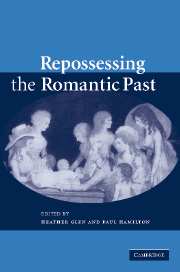Introduction
Published online by Cambridge University Press: 15 December 2009
Summary
How should we repossess the past? Applied to academic writing now about Romantic-period writing, this is a disingenuous question. It presupposes a scholarly field in which antagonistic critical positions are already drawn up in unignorable fashion. New work on British Romanticism is often characterized as much by its conscious difference from preceding positions as it is by its take on or choice of material. As a result, writing neglected or marginalized in one account will be restored to prominence in another. In fact, for some, such difference has become the point of the critical exercise itself. The past as we construct it becomes nothing more than a history of the present.
The quality of possession, though, is as important as its novelty. Quality of historical recovery, the chapters in this volume suggest, comes both from the critic's ability to respond to the particularity of a piece of Romantic writing and from her awareness of not one but several overarching contexts to which it could have belonged. The historical prism through which these essays view Barbauld, Edgeworth, Scott, Hazlitt, Coleridge, Godwin, and others is consciously chosen, certainly, but in a spirit of dialogue which allows the reader to judge if another angle of approach might have revealed more. Thus the critical conversation continues.
Marilyn Butler possesses this dialogic ability in full, and her work makes sense of the quality of historical sympathy required to repossess the Romantic past in a more than critically opportunistic sense.
- Type
- Chapter
- Information
- Repossessing the Romantic Past , pp. 1 - 18Publisher: Cambridge University PressPrint publication year: 2006

